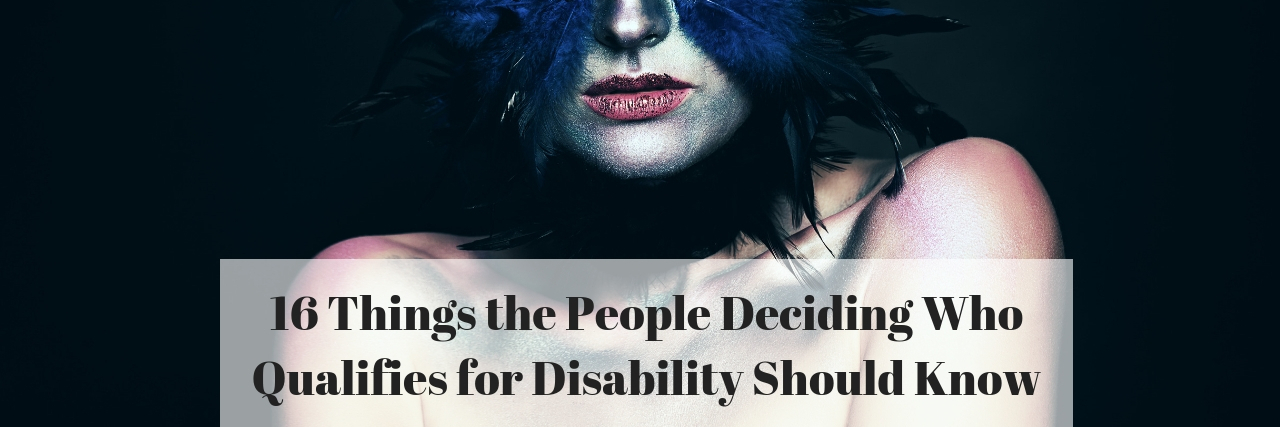16 Things the People Deciding Who Qualifies for Disability Should Know
Life with a chronic disease can be especially hard if you need to apply for disability. Not every disability is visible, and many people are unaware of how differently disability can present in our community. Often the process of being granted disability benefits can be debilitating and hurtful.
According to statistics by the Social Security Administration, around two-thirds of all first-time applicants are turned down. It is one thing to accept being disabled as someone living with a chronic health condition, but even worse if other people than doubt your experience and tell you that you are “not disabled enough” — something many people with chronic and invisible illnesses have experienced when they applied for disability.
To help others better understand the various appearances of disability, we asked our Mighty community what they wished people who decide if they qualify for disability knew.
And here is what our community shared with us:
- ”[I wish they knew] how inconsistent and unscripted my disease is. I can feel good for months and then suddenly without warning, be very ill again.” – Marisa S.
- ”My age shouldn’t be a factor in their decision-making process. Yes, I may be 27 but this body is fighting numerous hidden illnesses and age does not make it any easier. If anything, it makes it harder because I face a whole lifetime of pain when I’m just starting out.” Natasha M.
- ”I wish they knew that it’s hard to admit just how often an illness impacts our lives. I always like to think it’s only 40 percent, but realistically it’s more like 80 percent. It’s hard to accept we are sick enough to need assistance.” – Tiffany T.
- ”My imagination couldn’t make up the problems I experience. If I were faking, I wouldn’t think to complain about my types of bizarre and debilitating issues. I’m too tired to make it up.” – Sarah L.
- ”That I continued working to attempt to support myself, so just because I had minimal income (not enough to live on), it should not mean I am able to work.” – Lindsay P.
- ”We don’t want disability. We want to be able to work, but there’s no magic wand to just poof away our illnesses, so we have no other choice. Also paper cannot accurately show what the reality of our illness looks like.”
- ”I wish they knew I’ve tried my hardest to hold jobs and have been let go due to my health conditions.” – Lyssa A.
- ”I was denied because I could take care of my (at the time) toddler-aged son, spend time with my husband, and had crafting hobbies. My disabilities don’t invalidate my ability to be a mother, wife, and human being.” – Ashley P.
- ”That just because it is something your grandma can live with does not mean it is something I can. Also, that just because I may be ‘doing OK’ now does not mean I won’t be crashing tomorrow or next week for the next three months.” – Victoria M.
- ”My life is more than ever can be recorded on paper. You are getting clips not a full picture. I have a right to enjoy what aspects of life I can.” Amanda B.
- ”Not that I wish they knew, but I wish they had what we have. Only then could they possibly understand and have empathy.” – Jacki J.
- ”My pain is different from anyone else’s pain, and how I deal with it is different. I may not look like I’m in pain, but you don’t know how hard I fight to not show my pain.” – Hannah A.
- ”I wish there was more understanding especially for those people with multiple disabilities. When it comes to my case at least one of them is flaring at all times. So even if someone is not totally disabled by one condition, the group of them together is.” – Peyton K.
- ”[I wish they knew] that even though I have a desk job, it basically makes me incapable of doing anything when I leave work. My job makes me too mentally/physically fatigued to let me make a healthy dinner or to get in a little exercise; therefore I’m in worse health by working.” – Lisa K.
- ”I wish they knew that the income a family receives is still not an adequate measure to determine if they are able to afford their own care.” – Tab M.
- ”To them, the decision is just another form, another tick box. To me, it’s my future they’re deciding on. Sometimes they need to see the person beyond the piece of paper.” – Katie G.
For advice from our Mighty community about applying for disability with a chronic illness, check out these stories:
18 Things People Wish They Knew Before Applying for Disability Benefits
6 Things I’ve Learned Since Being Granted Social Security Disability Benefits

